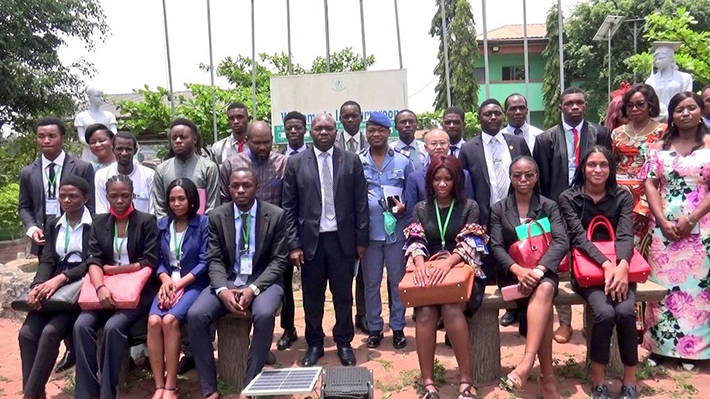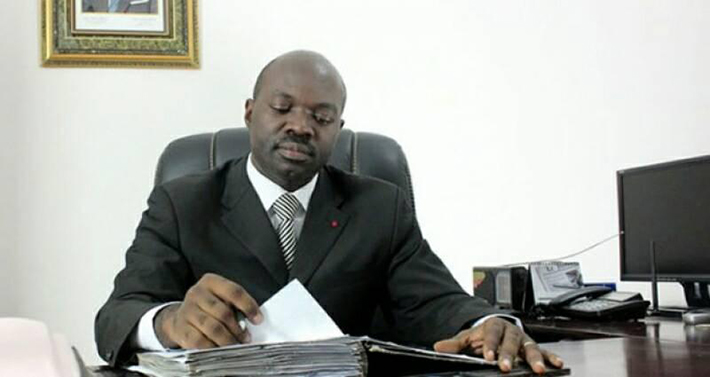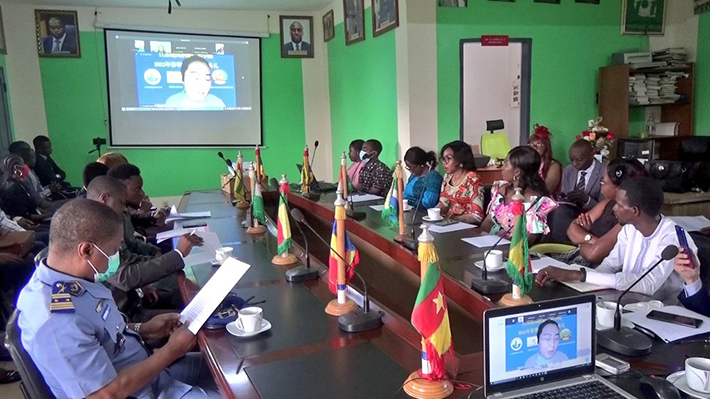|
||||||||||
| Home Nation World Business Opinion Lifestyle ChinAfrica Multimedia Columnists Documents Special Reports |
|
||||||||||
| Home Nation World Business Opinion Lifestyle ChinAfrica Multimedia Columnists Documents Special Reports |
| ChinAfrica |
| An Initiative for Excellence |
| China awards 75 scholarships to Cameroonian students |
| By FRANÇOIS ESSOMBA | VOL. 15 September 2023 ·2023-08-30 |

AII-Cameroon Resident Representative Armand Claude Abanda (centre) with scholarship students supported by the Chinese government in Yaoundé, Cameroon, on 19 June
The Chinese government has recently granted 75 scholarships to students studying at the African Institute of Informatics (AII) located in Yaoundé, Cameroon. This initiative reinforces China’s commitment to enhancing technological education for young people in Cameroon and Africa.
The official ceremony to mark this collaboration was held online on 19 June from the AII-Cameroon campus. The event was presided over by Armand Claude Abanda, the institution’s resident representative, in the presence of the students, their parents, and representatives of the Confucius Institute in Cameroon as well as Jiangsu Vocational Institute of Architectural Technology in Jiangsu Province, China.

Armand Claude Abanda
These scholarships provide an excellent opportunity for Cameroonian and African students to study in various fields, including ICT, renewable energy, telecommunications, management and electricity.
Established in 1999 in Yaoundé, AII-Cameroon is led by Armand Claude Abanda, a visionary who is widely recognised for his significant contribution to the development of ICT in Cameroon and Central Africa. In particular, Abanda launched an initiative to train 100,000 women in ICT by 2012, which earned him the 2015 Best African Manager Award for Women’s Empowerment. Abanda is the author of several publications, including ICTs as a Tool for Integration and Development. Abanda spoke to ChinAfrica about the scholarships granted by China and the Chinese government’s efforts to promote transfer of skills to Africa.

The scholarship award ceremony at the AII campus in Yaoundé, Cameroon, on 19 June
ChinAfrica: What implications do these scholarships have for your students, and how was the AII selected by the Chinese government?
Armand Claude Abanda: Our collaboration with the Confucius Institute in Cameroon spurred this development. We formed a partnership with the institute several years ago with the goal of integrating Chinese language teaching into our curriculum. We are the only university that has made Chinese language learning compulsory. In other universities, the language is not mandatory. To the best of my understanding, we were the only ones who had this requirement when we signed our agreement with the institute. Consequently, a student may fail an exam due to a lack of proficiency in Chinese. Furthermore, we have established a programme to invite Chinese teachers to teach at our institution annually.
What is the protocol for allocating these grants?
We signed an agreement to grant 75 scholarships in five years at a rate of 15 scholarships annually. Yet, this number may vary. For instance, this year, 16 students were able to travel to China through this programme.
What makes these Chinese scholarships so unique?
Students who receive these scholarships spend the first year of their study at AII-Cameroon. Following this, they spend 18 months in China, which includes a six-month internship. After returning to Cameroon, the next six months are dedicated to training, including a three-month internship. Upon successful completion of the course, they are awarded degrees from a Chinese university and the AII. After that, they receive recommendations from the Chinese government to join Chinese companies based in Africa. This represents authentic cooperation between China and Africa. This programme unites approximately 15 African universities with nearly 20 Chinese universities.
This programme exemplifies the Chinese government’s ambition to facilitate the transfer of technology and skills to Africa, empowering young Africans to become proficient in Chinese technologies.
What is your assessment of the Chinese government’s endeavours to train human resources in Cameroon and Africa?
The Chinese government’s dedication to education is undoubtedly tremendous. The scholarships offered to young Africans are a testament to this investment. Furthermore, I would like to highlight that, beyond this scholarship scheme, many students have already embarked on their studies in China. To obtain a scholarship and travel to China, a certain degree of proficiency in Chinese language is required. Students only need to cover the cost of their plane tickets. Once in China, everything else will be taken care of by the Chinese government. It’s evident that an ambitious collaboration project with China is in progress, and Africa will benefit from it. This presents a significant opportunity to transfer Chinese technical skills to Africa.
What is the value of these scholarships in promoting technical and professional skills in Cameroon and Africa?
These grants enable our students to gain cutting-edge skills, especially in emerging and future technologies. As IT progresses rapidly, the African curriculum, although robust, requires continuous updates. A computer scientist must keep pace with innovations. As a technological pioneer, China shares its expertise with African students. Through their training in China, these students are exposed to these innovations, which they then introduce to Cameroon and Africa. In doing so, they contribute to strengthening government initiatives, promoting the digital economy, advancing civil engineering, and the adoption of new digital technologies.
What is China’s significance for Africa today? What message would you like to convey to decision makers, particularly the Chinese government, to strengthen their ties with Africa?
Today, China is one of Africa’s key partners, especially in terms of skill transfer. It is essential to emphasise this fact since China was not the superpower that we know today until recently. It can serve as an inspiration for Africa, especially since many of its countries are still considered developing. China’s remarkable transformation has been due to technological advancements, a rigorous work ethic, human determination, and the solid training of its human resources. This is the path that Africa must adopt: prioritise training and invest in human capital to make our people the driving force behind the development and economic growth of our nations.
| About Us | Contact Us | Advertise with Us | Subscribe |
| Copyright Beijing Review All rights reserved 京ICP备08005356号-5 京公网安备110102005860号 |